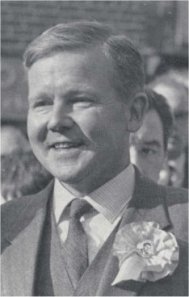Richard Wainwright (politician) facts for kids
Quick facts for kids
Richard Wainwright
|
|
|---|---|

c. 1950s–1960s
|
|
| Chairman of the Liberal Party | |
| In office 1970–1972 |
|
| Preceded by | Desmond Banks |
| Succeeded by | Cyril Carr |
| Member of Parliament for Colne Valley |
|
| In office 28 February 1974 – 18 May 1987 |
|
| Preceded by | David Clark |
| Succeeded by | Graham Riddick |
| In office 31 March 1966 – 29 May 1970 |
|
| Preceded by | Patrick Duffy |
| Succeeded by | David Clark |
| Personal details | |
| Born |
Richard Scurrah Wainwright
18 April 1918 Leeds, England |
| Died | 16 January 2003 (aged 84) Leeds, England |
| Political party | Liberal (before 1988) Liberal Democrats (after 1988) |
| Spouse |
Joyce Hollis
(m. 1948) |
| Children | 4, including Martin and Hilary |
| Education | Shrewsbury School Clare College, Cambridge (BA) |
Richard Scurrah Wainwright (born April 11, 1918 – died January 16, 2003) was a British politician. He was a member of the Liberal Party. He served as a MP for an area called Colne Valley. He was an MP from 1966 to 1970, and again from 1974 to 1987.
Contents
Early Life and Education
Richard Wainwright was born in Leeds, England. He went to Shrewsbury School. After that, he earned a special scholarship to study at Clare College, Cambridge, where he got a degree in History in 1938.
While at Cambridge, he became very interested in the Liberal Party. He joined the Cambridge University Liberal Club, which helped him learn more about politics.
First Jobs and War Service
After finishing university, Richard Wainwright worked as a Merchant Banker. This means he worked with banks that help businesses with money matters. However, he later left this job to focus more on his dream of becoming a politician.
During World War II, he chose not to fight in the war because of his beliefs. People who do this are called conscientious objectors. Instead, he joined the Friends' Ambulance Unit. This was a group run by Quakers (a Christian group) that helped people during the war. He served in places like Normandy in 1944, and later in Antwerp, the Netherlands, and Germany from 1944 to 1946.
Becoming a Member of Parliament
Richard Wainwright tried to become an MP for the Liberal Party several times. He first ran in the Pudsey area in 1950 and 1955, but he didn't win.
In 1956, he became the Liberal candidate for Colne Valley. He ran there in 1959, in a special election in 1963, and again in 1964. Each time, more people voted for him. Finally, in the 1966 general election, he won the seat and became an MP.
In the next election in 1970, he lost his seat to David Clark from the Labour Party. But he won it back in the February 1974 election. He continued to be the MP for Colne Valley until he retired from politics in 1987.
Roles in the Liberal Party
Richard Wainwright was very active within the Liberal Party. In 1953, he was chosen to be part of the party's main committee. He even served as the Chairman of the Liberal Party from 1970 to 1972.
He was especially interested in topics like jobs, trade, and how the government manages money. From 1961, he focused on local government issues at the Liberal Party's main office. He was a key spokesperson for the party on money matters and represented them on important financial committees. He also spoke for the party on trade, industry, and the economy. From 1968 to 1970, he led the Liberal Party's research team. After 1974, he focused on managing the party's money.
Life After Parliament
Even after he stopped being an MP in 1987, Richard Wainwright remained involved in politics. He worked for the Electoral Reform Society, which tries to make elections fairer. He also helped start Charter 88, a group that wanted to improve democracy in the UK.
From 1986 to 1997, he was also a leader in the Wider Share Ownership Council. This group encouraged more people to own shares in companies. When the Liberal Party joined with another party, the Social Democratic Party, to form the Liberal Democrats, Richard Wainwright became a member. He served as the President of the Liberal Democrats in the Yorkshire area from 1989 to 1997.
Richard Wainwright was also a Methodist lay preacher, which means he gave sermons in church without being a full-time minister. He helped with many local groups and charities. For example, he was involved with hospital committees and a savings bank. He also helped the Leeds Invalid Children's Aid Society. From 1959 to 1984, he was part of the Joseph Rowntree Reform Trust, which works on social issues. In 1988, he was honored by the Huddersfield Polytechnic (now the University of Huddersfield).
Family Life
Richard Wainwright married Joyce Hollis in 1948. Joyce was also very active in politics, especially with the Liberal women's groups in Yorkshire. She was a leader in the Colne Valley Women's Liberal Council for many years.
Richard and Joyce had four children. Two of their children became well-known in public life. Their son, Martin, was a Northern Editor for The Guardian newspaper. Their daughter, Hilary, is an academic and editor of Red Pepper magazine.
Richard Wainwright passed away in Leeds on January 16, 2003, at the age of 84. The offices of a later Liberal Democrat MP, Greg Mulholland, were named 'Richard Wainwright House' to remember him.
 | Sharif Bey |
 | Hale Woodruff |
 | Richmond Barthé |
 | Purvis Young |

